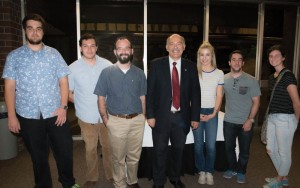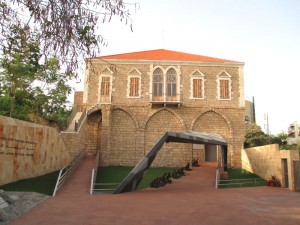
Photo: Hourig Attarian
Aramayis Orkusyan
Staff Writer
During the summer of 2016, Professor Barlow Der Mugrdechian, director of the Armenian Studies Program at Fresno State, had the opportunity to travel to Lebanon–one of the most important Armenian diasporan centers–for the first time. Der Mugrdechian was invited by the Tekeyan Cultural Association to give a talk in Beirut, where he spoke on June 7 about the Armenian community of Fresno: its establishment, organization, and important landmarks. While in Lebanon, Professor Der Mugrdechian also visited many of the important Armenian educational, religious, and cultural institutions and met with community leaders.
Der Mugrdechian discussed his trip in the first lecture of the Armenian Studies Program Fall Lecture Series titled “The Armenian Diaspora: Lebanon.” Der Mugrdechian’s talk on Friday, September 9 not only detailed his trip, but also discussed the significance of the Armenian community of Lebanon focusing on three basic aspects of the community: the role of the church, the role of education, and the role of cultural organizations.
Following the Armenian Genocide, Lebanon became the center of the Armenian diasporan community in the Middle East reaching a peak population of approximately 225,000–250,000 Armenians in 1975, on the eve of the Lebanese Civil War.
“All of the traditional institutions, which today we see even in our community here in Fresno, already established their headquarters in Beirut, Lebanon by 1975,” stated Prof. Der Mugrdechian. Lebanon became the headquarters of the three traditional Armenian political parties, the Catholicosate of Cilicia, the Armenian Catholic Church, and the Armenian Evangelical Church.

Photo: Barlow Der Mugrdechian
In Lebanon, much like in Fresno, churches have been central in the effort to maintain a strong Armenian community. “The role of the church in the Armenian community, wherever it is in the world, is the same. It is a promoter of Armenian identity, a place for community interaction, and a center of social life,” said Der Mugrdechian. The importance of churches is perhaps more visible in Lebanon than in any other diasporan community as Lebanon is home to 14 Apostolic Armenian churches, 10 Armenian Catholic churches, and 8 Armenian Evangelical churches.
Professor Der Mugrdechian visited the Armenian Catholic Monastery in Bzommar, which has become the headquarters of the Armenian Catholic Church worldwide and also houses one of the largest collections of Armenian manuscripts in the world. There, Der Mugrdechian had the opportunity to meet with Very Rev. Father Antranig Granian, editor of the Haigazian Armenological Review and one of the important scholars in the field of Armenian Studies, and with Monsignor Gabriel Muradian, head of the monastery.
Additionally, Der Mugrdechian traveled to Antelias, headquarters of the Armenian Catholicosate of the Great House of Cilicia, and Bikfaya, the summer residence of the Catholicos. In Bikfaya, Prof. Der Mugrdechian was privileged to be granted an audience with the Catholicos, His Holiness Aram I, with whom he discussed the current state of the Armenian community in Fresno and learned of the challenges facing the Armenian community in Lebanon. His Holiness presented Der Mugrdechian with the gift of one of the Catholicosate’s recent significant publications, The Catholicosate of Cilicia—History, Mission, Treasures (Antelias, 2015).
Equally important to maintaining an Armenian identity in diasporan communities is the education system. “One of the most important aspects of rebuilding communities was building schools,” said Prof. Der Mugrdechian. “After the Genocide, Armenians placed a priority on education. They built schools and Lebanon is the best example of that because so many schools were built there,” continued Der Mugrdechian. At its peak, Lebanon had 56 Armenian schools with approximately 21,000 students. “Beirut became the intellectual hub of the diaspora, with the publication of books and newspapers in the Armenian language,” said Der Mugrdechian.
Today, there are many challenges facing both the higher and lower education systems in Lebanon. Prof. Der Mugrdechian visited Haigazian University, where he met with President Rev. Dr. Paul Haidostian and discussed some of these challenges. Two of the big challenges facing education today are that there are too many spaces and not enough students, and that tuition is expensive relative to the income of the people in Lebanon.
“Against all odds, however, Armenian education is still being pursued in Lebanon. Considering the turmoil, the civil war, all the economic disturbances, and political instability, we might think otherwise. However, maintenance of Armenian schools is a really important priority for Armenians in Lebanon,” said Prof. Der Mugrdechian.
Professor Der Mugrdechian’s talk highlighted the continued vitality of the Armenian community in Lebanon, despite the adversities faced. Much like in Fresno, the Armenians of Lebanon strive to maintain their identity and communal life.
 Hye Sharzhoom Armenian Action
Hye Sharzhoom Armenian Action